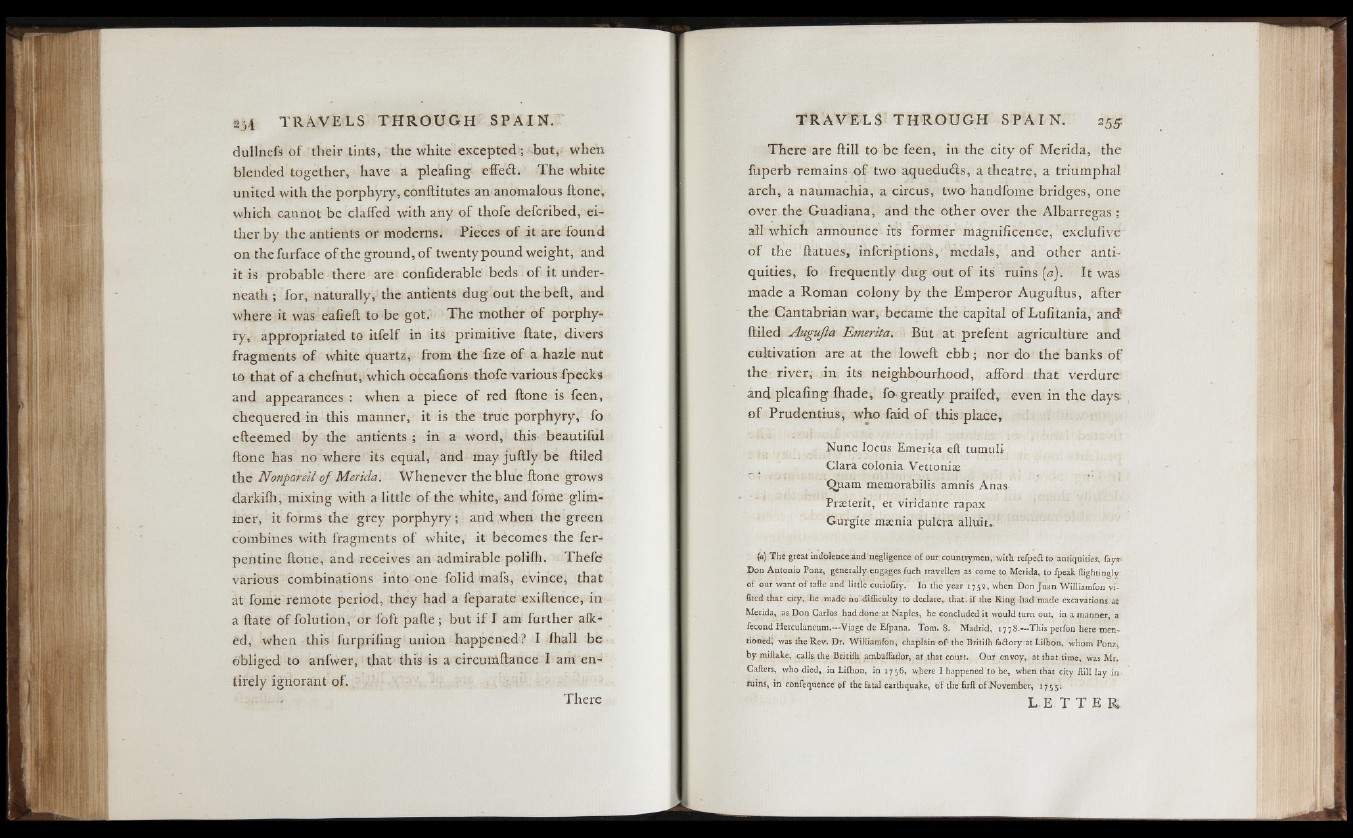
dullnefs of their tints, the white excepted; but, when
blended together, have a pleafing effect. The white
united with the porphyry, conftitutes an anomalous itone,
which cannot be claffed with any of thofe defcribed, either
by the antients or moderns. Pieces of it are found
on the furface of the ground, of twenty pound weight, and
it is probable there are confiderable beds o f it underneath
; for, naturally, the antients dug out the bell, and
where it was eafieft to be got. The mother of porphyry,
appropriated to itfelf in its primitive ftate, divers
fragments of white quartz, from the fize of a hazle nut
to that o f a chefnut, which occafions thofe various fpecks
and appearances : when a piece of red flone is feen,
chequered in this manner, it is the true porphyry, fo
efteemed by the antients; in a word, 1 this- beautiful
ftone has no where its equal, and mayjuftly be ftiled
the Nonpareil of Merida. Whenever the blue ftone grows
darkiih, mixing with a little o f the white, and fome glimmer,
it forms the grey porphyry ; and when the green
combines with fragments of white, it becomes the Terpentine
ftone, and receives an admirable poiiih. Thefe
various combinations into One folid mafs, evince, that
at fome remote period, they had a feparate exiftence, in
a ftate of folution, or foft pafte; but if I am farther alk-
ed, when this furpriling union happened ? I ihall be
obliged to anfwer, that this is a circumftance I am entirely
ignorant of.
There are ftill to be feen, in the city of Merida, the
fuperb remains o f two aquedu<fts, a theatre, a triumphal
arch, a naumachia, a circus, two handfome bridges, one
over the Guadiana, and the other over the Albarregas;
all which announce its former magnificence, exclufive
of the ftatues, infcriptionk,' medals, and other antiquities,
fo frequently dug out of its ruins (a). It was
made a Roman colony by the Emperor Auguftus, after
the Cantabrian war, became the capital o f Lufitania, ancf
ftiled Augufia Emérita. But at prefent agriculture and
cultivation are at the loweft eb b ; nor do the banks o f
the river, in its neighbourhood, afford that verdure:
and pleafing fhade, fo-greatly praifed, even in the days:
o f Prudentius, who faid o f this place,
N u n c l o c u s E r o e r i - t a e f t t u m u l i
C l a r a c o l o n i a . V e t t o n i z e
Q u a m m e m o r a b i l i s a m n i s A n a s /
P r z e t e r i t , e t v i r i d a n t e r a p a x
G u r g i t e m z e n i a p u l c r a a l l u i t ^
(«) The great indblenceand ’negligence of our countrymen, with refpeil to antiquities', fay&
Don Antonio Ponz, generally, engages fuch travellers as come to Merida, to fpeák flightingly
of our want o f tafle and little curiofity.' In the year 1752, when Don Juan Williamfon vi-
fited that city, he made no'difficulty to declare,, that, if the King had imade excavations at
Merida, as Don Carlos had done at Naples., he concluded it would turn out, in a manner, a
fecond Herculaneum.— Viage de Efpana. Tom. 8. Madrid, 1778.— This petfon here mentioned,
was the Rev. Dr. Williamfon; chapláin o f1 the Britifh fa<ftory'at Lifbon, whom Ponz;
by miftake, calls, the Britifh. .ambaíTador, at .that court.. Our envoy,. at that time, Was Mr.
Gafters, who died,, in Lifbon, in 1756, where I happened to be, when that city ftill lay in
ruins, in conféquence of the fatal earthquake, of the firft o f November, 1755*
L E T T E E.